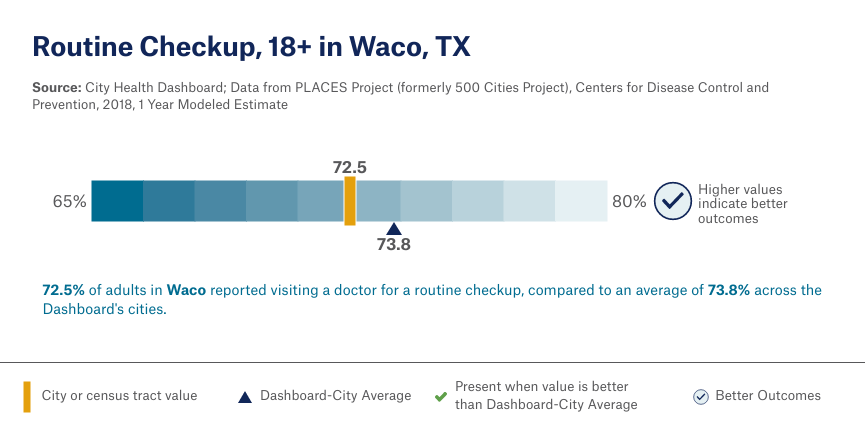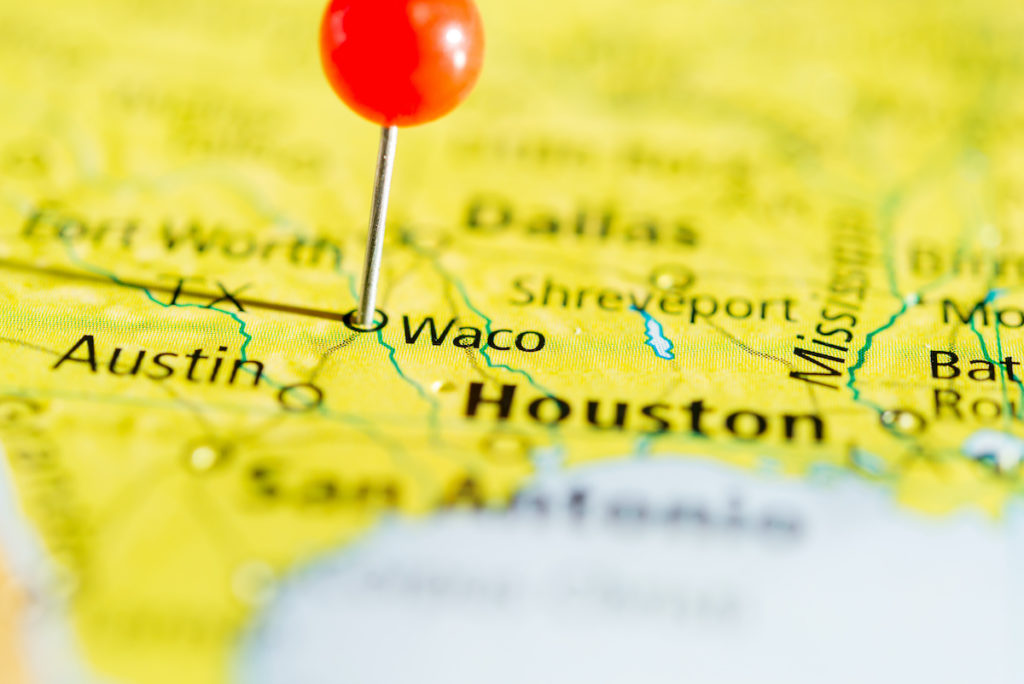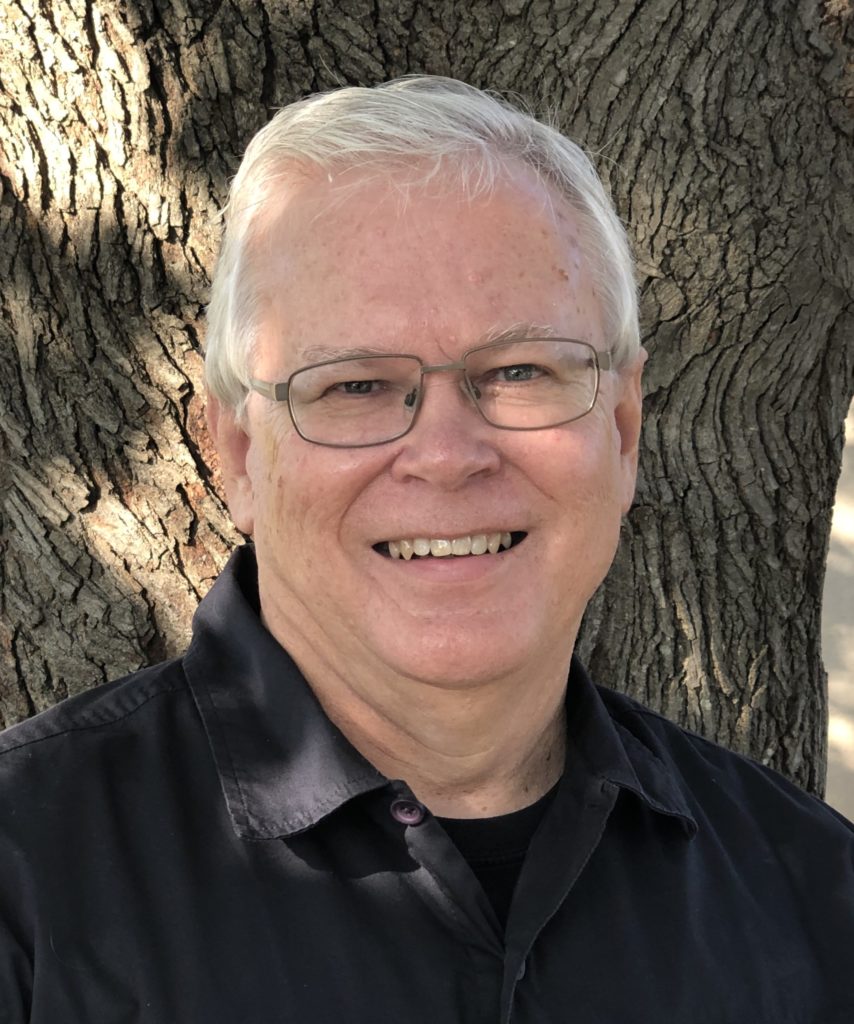By Deneece Ferrales
One-quarter of Waco residents did not see a physician for any type of routine services in 2018, the last year for which such data is available. Data from the City Health Dashboard indicates many residents do not have a primary care physician or a “medical home.”
To help more Wacoans access care, Prosper Waco’s Access to Healthcare Working Group has planned an event, “Christmas on Memorial,” 4-7 p.m. Tuesday, Dec. 7, at the Family of Faith Worship Center, 4112 Memorial Dr. The event is a partnership between the church, McLennan County Indigent Health Care, and other organizations involved with the working group. (More details below.)
The lack of access to primary health care is particularly prevalent in certain Waco ZIP codes that include many lower income and Black and Hispanic residents. The problem not only puts residents at risk but also taxes the healthcare delivery system because the lack of regular healthcare often leads to undiagnosed problems that grow bigger. This leads to urgent care, including trips to the emergency room.
The following graph illustrates the percentage of Waco/ McLennan County residents who have seen a primary care physician within a year and the bullets underneath give the percentages for the most affected ZIP codes.

When broken down by ZIP code and census tract, the problem becomes more glaring.
- 76701, Track #1: only 66.6% of adults had a routine checkup in the past year
- 76705, Track #33: only 65.9% of adults had a routine checkup in the past year
- 76706, Track #2: only 66.5% of adults had a routine checkup in the past year
- 76798, Track #3: only 66.3% of adults had a routine checkup in the past year
Participants in “Christmas on Memorial” will have access to the following:
- Groceries for their families;
- Health screening from Ascension;
- Behavioral health screening from Heart of Texas Region MHMR,
- A COVID vaccine;
- Buy and wrap Christmas presents for kids at a reduced cost;
- Be entered into a drawing for prizes, including kids’ bicycles;
- Apply for health insurance and/or health benefits;
- Talk to a number of health agencies and providers about healthcare options and benefits; and
- A visit with Santa or play time in an on-site bounce house, along with an assortment of other kids’ activities.
The event is being held to help our community connect with healthcare resources. This event was planned by the Access to Healthcare Working Group, which is co-chaired by Heather Travers of McLennan County Indigent Healthcare and Deneece Ferrales of Prosper Waco.
For more information about this event or to sign up for a table at the event, please contact [email protected] or [email protected]. Flyers are available for distribution.
If you would like more information about the work of the Access to Healthcare Working Group, you please contact co-chairs Heather Travers or me at the emails above.
Deneece Ferrales, Ph.D., is director of health initiatives with Prosper Waco.
The Act Locally Waco blog publishes posts with a connection to these aspirations for Waco. If you are interested in writing for the Act Locally Waco Blog, please email Ferrell Foster.
By Ferrell Foster
People mean different things when they say “Waco.” Some mean the Waco of a few years ago (much smaller geographically); others think primarily of downtown and Baylor (where the action is), others mean the current city limits (reaching further and further out).
When I think of Waco, I think of what I call Big Waco and some call Greater Waco. I think of the city, plus Woodway, Hewitt, China Spring, Lacy Lakeview, Bellmead, Robinson, even all of McLennan County. Big Waco is big.

The national City Health Dashboard identifies 10 city types and includes 57 small to midsize Texas cities in their data. Waco is considered a “regional hub.” There are only three regional hubs in Texas — Beaumont, Port Arthur, and Waco. Nearby Temple is identified as a “working town.” College Station, Denton, and San Marcos are called “college cities.”
The regional hub designation, I think, captures the essence of Waco. We are different from a working town or a college city. We are more — for better or worse.
The better part of being a regional hub is that people from surrounding communities come here to do business and to be entertained. Central Waco is like a magnet drawing people and resources to its core and helping all regional residents enjoy a better-resourced, more-connected life.
But there is a downside for regional hubs. The City Health Dashboard says this of the group: Regional hubs are “midsize ‘micropolitan’ cities that serve as hubs within smaller metro areas, with high inequality and large Black populations, where most residents work locally, and populations are decreasing.” Here are some characteristics of regional hubs:
— Great income inequality; “Black households earned 46% less than their White counterparts and this wage gap has been increasing.” (In Waco, Blacks earn about 40% less than Whites. In McLennan County, 47% less.)
— An average of 25% of residents live below the federal poverty line. (In Waco, 26.2% are below the poverty line. In the county, 19%.)
— Average life expectancy of 76 years at birth. (In Waco, 77 years.)
— Average rent burden of 54%, with an increase of 11.8% between 2000 and 2017
across cities.
(My thanks to the Prosper Waco research team for the local numbers.)
The future of Waco is captured in this simple picture. As a regional hub, we have a real opportunity for economic growth and lifestyle satisfaction. But, we should not be content with only a part of Waco and its region doing well. We need to care about racial, financial, and health inequities.
If we can address the downside challenges while we pursue the upside opportunities, we will be more than a regional hub; we will be a very good place to live, work, and do business.
I have two basic points here:
First, some people have a narrow view of Waco (the central city). I think it’s good for us to see this community more broadly, including acceptance of the surrounding towns and school districts as part of one whole. Each city/town, neighborhood, and school district is distinct, but we are connected — Big Waco.
Second, those who do not live in the parts of Big Waco that face serious economic and health challenges are still connected to those neighborhoods. In order for Big Waco to prosper, all of us are needed, especially in addressing our most challenging issues.
My faith tells me it is critical to love my neighbor. And love in that context does not mean an emotion; it is a commitment to serve. And neighbor is not just the person next door; it is anyone in need that I can help. Waco needs to be a place of good neighbors in the best and highest since of the phrase.

Ferrell Foster is acting executive director of Act Locally Waco and senior content specialist for care and communication with Prosper Waco.
The Act Locally Waco blog publishes posts with a connection to these aspirations for Waco. If you are interested in writing for the Act Locally Waco Blog, please email Ferrell Foster at [email protected].
